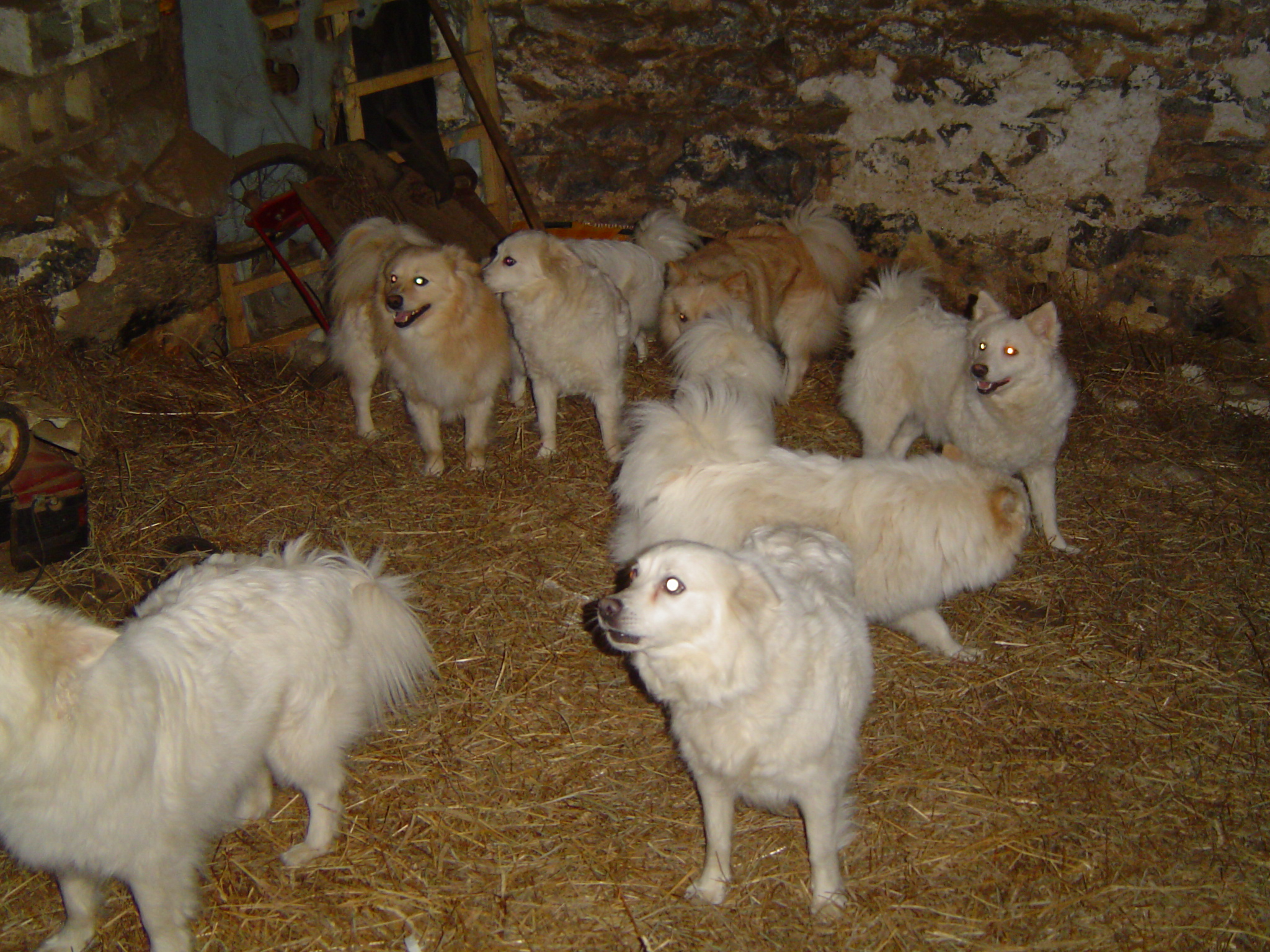The Story of the PA-13 Dogs
Written by Jim Park
 Many people wonder about their adopted dog's past. Where did he come from? What happened in his past? Unfortunately, there are too many circumstances that cause dogs to become homeless. One recent case was 13 American Eskimo Dogs that had been raised in a barn in Carlise, Pennsylvania. The PA-13, as they became known, were originally from a single un-neutered male and un-spayed female dog, who logically reproduced. The owner did not think that the dogs would continue to breed as they removed the male dog and left the offspring to grow. Unfortunately dogs will very readily inbreed. So the number of dogs increased and they were put into a barn to live together. By the time the ERU became involved 5 of the female dogs were already pregnant. Many people wonder about their adopted dog's past. Where did he come from? What happened in his past? Unfortunately, there are too many circumstances that cause dogs to become homeless. One recent case was 13 American Eskimo Dogs that had been raised in a barn in Carlise, Pennsylvania. The PA-13, as they became known, were originally from a single un-neutered male and un-spayed female dog, who logically reproduced. The owner did not think that the dogs would continue to breed as they removed the male dog and left the offspring to grow. Unfortunately dogs will very readily inbreed. So the number of dogs increased and they were put into a barn to live together. By the time the ERU became involved 5 of the female dogs were already pregnant. Dogs that are not raised around humans are not socialized and they can be quite fearful of humans. They are difficult to catch and will struggle when they are held. They typically shake with fear and will hide when possible. If put in a crate and a car, they usually will get sick in only a few minutes of the start of the car ride. Moving fearful dogs like this is a very stressful experience for the dog as well as the human. These dogs do not make good housepets as they are typically not housebroken. It takes lots of time and work with such a dog before they will possibly come out of their shell. What does it mean to have to take care of these dogs? It means:
Here are some statistics and information about the dogs in this group:
Mom - 4 1/2 year old - Pending Adoption Buster - 12 week old puppy - Pending Adoption Paige - 12 week old puppy - Pending Adoption Gus - 3 1/2 year old Mitzie - 3 1/2 year old - Gave birth to three puppies; only one survived Jenna - 2 year old - Gave birth to four puppies; three survived Harley - 2 year old Sasha - 2 year old - Gave birth to three puppies; only one survived Maggie - 2 year old - Gave birth to nine puppies; four survived Sadie - 10 month old - Gave birth to three or four puppies; none survived Teddy - 10 month old - Pending Adoption Tiffany - 10 month old - Pending Adoption Charlie - 10 month old - Sent to the HOPE prison program and is Pending Adoption once he comes out of the program That's a total of 13 dogs and 9 newborn puppies that survived!  The total cost of vet care for the entire group of dogs is about $6600. This includes only the neutering/spaying and vaccinations. The amount could be significantly larger if there are any medical issues. The total cost of vet care for the entire group of dogs is about $6600. This includes only the neutering/spaying and vaccinations. The amount could be significantly larger if there are any medical issues. Thankfully, some of the dogs will be going to their new forever homes soon. Other dogs will require months of time and training for socialization. Sadly, there are one or two dogs that may never be able to be handled by humans. This entire issue would have been prevented if the owner of the original pair of dogs had simply spayed and neutered them! Regrettably this situation happens all too often in our society. As you can see, it takes a lot of work, time and money to rescue dogs in these types of situations. Lucky for these dogs, the ERU was able to step in and help out, becuase in many communities where space and people are not available, these dogs would simply have been euthanized. You can see a video of these dogs at: http://www.youtube.com/watch?v=K77K_kUBWk0.
Last Updated: Thu, June 12 2008 22:40:56
This is only the beginning of the story. Your support will help ERU determine the ending. |
Featured EskieDonateConnect With Us |





